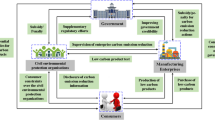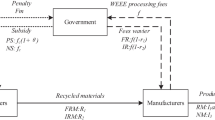Abstract
The implementation of the extended producer responsibility (EPR) for e-waste is an important measure to develop an ecological civilization. In order to advance manufacturing enterprises to effectively implement resource and environmental responsibility, this study investigates the main causes of environmental regulation failure from the perspective of government and enterprises. The game theory was used to establish an evolutionary game model between government regulatory departments and electronic and electrical products’ manufacturing enterprises. A system dynamic model was utilized to construct the stock-flow graph of the game between government and enterprises, and to carry out simulation analysis under different strategies. The results found that the probability of an enterprise undertaking extended responsibility gradually increased and stabilized with the increase of government supervision and punishment intensity; the government’s regulatory probability and punishment are important factors affecting the enterprises’ compliance with regulations and responsibilities. The study suggests that government should focus on strengthening environmental regulations from the aspects of improving laws and regulations, establishing a regular monitoring system and innovating incentive and constraint mechanism.








Similar content being viewed by others
References
Arora M, Sharma M, Bose D, 2018 Step towards e-waste management (STEM). Advances in health and environment safety (pp. 83–88): Springer.
Berry MA, Rondinelli DA (1998) Proactive corporate environmental management: a new industrial revolution. Acad Manag Perspect 12(2):38–50
Bhutta, M. K. S., Omar, A., Yang, X., 2011. Electronic waste: a growing concern in today’s environment. Economics Research International 2090–2123.
Chang J, John R (2014) China shifts focus to environment. Icis Chemical Business
Cheng Z, Li L, Liu J (2017) The emissions reduction effect and technical progress effect of environmental regulation policy tools. J Clean Prod 149(Complete):191–205
Cheng ZH, Li LS, Liu J, Zhang HM (2018) Total-factor carbon emission efficiency of China’s provincial industrial sector and its dynamic evolution. Renew Sust Energ Rev 94(3):330–339
Dungumaro EW, Madulu NF (2003) Public participation in integrated water resources management: the case of Tanzania. Physics & Chemiestry of the Earth Parts A/b/c 28(20):1009–1014
Elahi E, Abid M, Zhang H, Weijun C, Hasson SU (2018a) Domestic water buffaloes: access to surface water, disease prevalence and associated economic losses. Prev Vet Med. https://doi.org/10.1016/j.prevetmed.2018.03.021
Elahi E, Abid M, Zhang L, ul Haq S, Sahito JGM (2018b) Agricultural advisory and financial services; farm level access, outreach and impact in a mixed cropping district of Punjab, Pakistan. Land Use Policy 71:249–260. https://doi.org/10.1016/j.landusepol.2017.12.006
Friedman D (1998) On economic applications of evolutionary game theory. J Evol Econ 8(1):15–43
Giovanni PD (2011) Environmental collaboration in a closed-loop supply chain with a reverse revenue sharing contract. Ann Oper Res 220(1):135–157
Herat S, Agamuthu P (2012) E-waste: a problem or an opportunity? Review of issues, challenges and solutions in Asian countries. Waste Manag Res 30(11):1113–1129
Khan M, Chang YC (2018) Environmental challenges and current practices in China—a thorough analysis. Sustainability. 10(7):2547
Li ZJ, Tang DC et al (2018) Comprehensive evaluation of regional sustainable development based on data envelopment analysis. Sustainability. 10(11):3897
Meade L, Sarkis J (2002) A conceptual model for selecting and evaluating third-party reverse logistics providers. Supply Chain Manag 7(5):283–295
Ma P, Wang H, Shang J (2017) Enhancing corporate social responsibility: contract design under information asymmetry. Omega. 67:19–30
Nnorom IC, Osibanjo O (2008) Overview of electronic waste (e-waste) management practices and legislations, and their poor applications in the developing countries. Resour Conserv Recycl 52(6):843–858
Ongondo FO, Williams ID, Cherrett TJ (2011) How are WEEE doing? A global review of the management of electrical and electronic wastes. Waste Manag 31(4):714–730
Peng B, Tu Y, Elahi E, Wei G (2018a) Extended producer responsibility and corporate performance: effects of environmental regulation and environmental strategy. J Environ Manag 218:181–189
Peng B, Tu Y, Wei G (2018b) Can environmental regulations promote corporate environmental responsibility? Evidence from the moderated mediating effect model and an empirical study in China. Sustainability 10(3):641
Peng B, Tu Y, Wei G, 2018c Governance of electronic waste recycling based on social capital embeddedness theory. J Clean Prod 187, S0959652618305973.
Shih LH (2001) Reverse logistics system planning for recycling electrical appliances and computers in Taiwan. Resour Conserv Recycl 32(1):55–72
Spicer AJ, Johnson MR (2004) Third-party demanufacturing as a solution for extended producer responsibility. J Clean Prod 12(1):37–45
Schaltegger S, Burritt R (2017) Contemporary environmental accounting: issues, concepts and practice. Routledge
Tang DC, Shen ZQ, Li CS, Chen YM (2012) Policies of developed countries and policy choices of China low-carbon manufacturing. Energy Procedia 01(088):547–552
Tietenberg TH, Lewis L (2016) Environmental and natural resource economics. Routledge
Tang DC, Tang JX (2017) Environmental regulation efficiency and total factor productivity—effect analysis based on Chinese data from 2003 to 2013. Ecol Indic 73:312–318
Woods ND (2006) Interstate competition and environmental regulation: a test of the race-to-the-bottom thesis. Soc Sci Q 87(1):174–189
Wang HF (2016) The causes and governance of local governments’ environmental regulation paradox. Admienistration Forum 23(1):72–77 (in Chinese)
Wang LH, Gong ZW, Gao G, Wang CK (2017) Can energy policies affect the cycle of carbon emissions? Case study on the energy consumption of industrial terminals in Shanghai, Jiangsu and Zhejiang. Ecol Indic 83:1–12
Wu XH, Cao YR, Xiao Y, Guo J (2018) Finding of urban rainstorm and waterlogging disasters based on microblogging data and the location-routing problem model of urban emergency logistics. Ann Oper Res:1–32
Zhang, Y.H., Nie, Q., 2010. Game analysis in environmental seupervision. Ecol Econ. 02, 128–130. (in Chinese)
Zhang XG, Zhong MC (2011) Gaeme analysis and countermeasure research on government environmental supervision and enterprise pollution. China Popul Resour Environ 02:31–35. (in Chinese)
Zeng X, Gong R, Chen W-Q, Li J (2016) Uncovering the recycling potential of “New” WEEE in China. Environ Sci Technol 50(3):1347–1358
Zhang HM, Xu ZD, Zhou DQ (2017a) Waste cooking oil-to-energy under incomplete information: identifying policy options through an evolutionary game. Appl Energy (185):574–555
Zhang HM, Zheng Y, Cao J, Qiu YM (2017b) Has government intervention effectively encouraged the use of waste cooking oil as an energy source? Comparison of two Chinese biofuel companies. Energy 140(paret 1):708–715
Zhou X, Feng C (2017) The impact of environmental regulation on fossil energy consumption in China: direct and indirect effects. J Clean Prod 142
Zhang S, Ding Y, Liu B, Chang CC (2017c) Supply and demand of some critical metals and present status of their recycling in WEEE. Waste Manag 65:113–127
Zhang HM, Zheng Y, Zhou DQ, Long XL (2018) Selection of key technology policies for Chinese offshore wind power: a perspective on patent maps. Mar Policy 93):47–53
Zhang L, Reniers G, 2018. Game theory for menaging security in chemical industrial areas: Springer.
Acknowledgments
The authors are grateful to the case company for permitting and supporting this research.
Funding
This work was financially supported by the National Natural Science Foundation of China (Nos. 71263040, 71850410541), the Key Projects of Philosophy and Social Science for Universities in Jiangsu (Nos. 2017ZDIXM119, 2017ZDTXM007), the Social Science Foundation of Jiangsu (Nos. 17GLD013, 17DDA007), HRSA, US DHHS (Grant No. H49MC00068); Startup Foundation for Introducing Talent of Nanjing University of Information Science and Technology (NUIST), People’s Republic of China (Grant No. 2017r101), Key project of meteorological soft science of China meteorological administration(2019ZDIANXM25), the Postgraduate Research & Practice Innovation Program of Jiangsu Province (No. KYCX18_1041, No. SJKY19_0984), the Practical Innovation Training Program for College Students in Jiangsu Province (No. 201810300063Y), Key Project of National Social and Scientific Fund Program (16ZDA047), Project of National Social and Scientific Fund Program (17BGL142), and the open project of China Institute of Manufacturing Development (SK20180090-13).
Author information
Authors and Affiliations
Corresponding authors
Additional information
Responsible editor: Philippe Garrigues
Publisher’s note
Springer Nature remains neutral with regard to jurisdictional claims in published maps and institutional affiliations.
Rights and permissions
About this article
Cite this article
Peng, B., Wang, Y., Elahi, E. et al. Behavioral game and simulation analysis of extended producer responsibility system’s implementation under environmental regulations. Environ Sci Pollut Res 26, 17644–17654 (2019). https://doi.org/10.1007/s11356-019-05215-w
Received:
Accepted:
Published:
Issue Date:
DOI: https://doi.org/10.1007/s11356-019-05215-w




